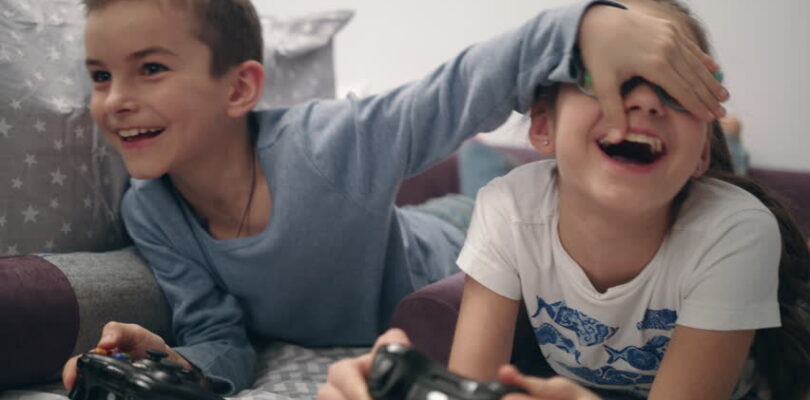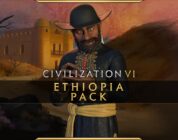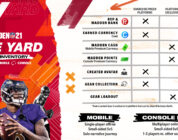
Exclusive interview with video game story writer and author, Rhianna Pratchett, launched alongside new resources for young people and parents: literacytrust.org.uk/videogames
New research by the National Literacy Trust found that:
- Video games can provide young people with a route into reading and writing, with 79% reading and 63% writing game-related materials regularly
- Three quarters (73%) of reluctant readers say playing video games helps them feel like they are part of a story, while two-thirds (65%) say video games help them imagine being someone else, suggesting potential benefits for empathy
- 3 in 5 (58%) young people declared an interest in writing or designing video games
- Almost two thirds (60%) of parents say communicating with friends via video games during lockdown has helped their child’s mental wellbeing
- Potential benefits of video games for literacy are strongest for boys and reluctant readers
New research published today by the National Literacy Trust finds that playing video games can support young people’s literacy, creativity and empathy1, while parents say communicating with friends through video games during lockdown has been helpful for their child’s mental wellbeing2. These benefits were found to be strongest for boys and reluctant readers.
The research was carried out as part of a new campaign from the National Literacy Trust, the Association of UK Interactive Entertainment (Ukie) and Penguin Random House Children’s to explore the relationship between video games and literacy engagement amongst school children.
A survey of 4,626 young people aged 11-16 in the UK found that video games can provide young people with a route into reading and improve confidence in reading skills. 4 in 5 (79%) young people who play video games read materials relating to video games, including in-game communications (40%), reviews and blogs (31%), books (22%) and fan fiction (19%); while 1 in 3 (35%) believe playing video games makes them better readers.
What’s more, video games can encourage young people’s creativity through writing. 3 in 5 (63%) young people who play video games write something relating to video games, including video game scripts (28%), advice to help other players (22%), fan fiction (11%) and blogs or reviews (8%). What’s more, 3 in 5 (58%) young people would also like to write or design video games and more than 3 in 10 (31%) would like more opportunities to read and write about video games in school.
Video games were also found to have potential benefits for increasing empathy, with two-thirds (65%) of young people saying that playing video games helped them imagine being someone else.
The shared cultural experience of playing video games was also found to support positive communication with friends and family. Three-quarters (76%) of young people talk to their friends about video games compared with only 3 in 10 (29%) who discuss books. In addition, young people said that playing video games helps them to build social connections both ‘in real life’ and online.
Many young people said that playing video games helps them either deal with, or escape from, stress and difficult emotions. The role of video games in supporting young people’s mental wellbeing was also key during lockdown. More than half (56%) of parents said their child had chatted with family and friends as part of playing a video game during lockdown and 3 in 5 (60%) felt that this communication had been helpful for their child’s mental wellbeing during this time.

The benefits of playing video games for young people’s literacy were found to be strongest for boys and reluctant readers. Boys are much more likely to play video games than girls (96% vs 65%) and nearly twice as many boys than girls said they chatted with family and friends as part of playing a video game during lockdown (71% vs 40%). Video games were also found to be effective at engaging reluctant readers with stories, as 3 in 4 (73%) young people who don’t enjoy reading say playing video games helps them feel more part of a story than reading a book-based text.
To further support young people’s literacy though video game playing, the National Literacy Trust, Ukie and Penguin Random House Children’s have launched a range of activities and resources for parents and young people at literacytrust.org.uk/videogames, including:
- An exclusive video interview from family video games expert and journalist, Andy Robertson, with award-winning scriptwriter, story designer and author, Rhianna Pratchett, about the benefits of video games for young people’s literacy and how good literacy skills can provide young people with a route into working in the video games industry
- A series of pen portraits from leading industry figures, including the President of ZeniMax Online, the Editor of Edge magazine and the lead narrative designer for RuneScape, to show young people how central literacy is to their job roles, collated and hosted by Ukie
- A book list packed with inspiring reads for children aged 11+ who love video games, from Penguin Random House Children’s
- A list of recommended video games to support children’s literacy for parents, curated by Andy Robertson and hosted on taminggaming.com
Jonathan Douglas, Chief Executive of the National Literacy Trust, said: “We know that video games are a part of everyday life for so many children, young people and families across the UK, so it is exciting to uncover the opportunities that video game playing can provide for young people to engage in reading, stimulate creativity through writing, enhance communication with friends and family, and support empathy and wellbeing.
“COVID-19 has significantly disrupted young people’s literacy and learning in recent months, and we want to ensure that no stone is left unturned when it comes to identifying new and innovative ways to support children’s literacy when they return to school in September. Through our partnership with Ukie and Penguin Random House Children’s, we hope to be able to provide families and schools with the resources and tools they need to best harness the benefits of video games for young people’s literacy.”
Rhianna Pratchett, who has worked on Tomb Raider, Heavenly Sword and Mirror’s Edge, and who has written the Tomb Raider graphic novel series (Dark Horse Books/Penguin Random House), said: “Video games transport us into new worlds, new experiences and make us feel part of the story like no other medium. It’s no surprise to see that young people’s engagement with video games is at an all-time high, and it’s great to see the important work the National Literacy Trust are doing to better understand how games can help improve literary, emotional engagement and understanding in their audience.”
Dr Jo Twist OBE, CEO of Ukie, said: “This excellent research shows both the benefits of games on children’s literacy and how valuable a part they are to young people’s lives. Games are a fantastic way to inspire creativity, encourage exploration of worlds and characters, and to get young people talking with friends or family. We look forward to working with our partners to build on this work to show the positive impact of games as a medium.”
Alex Moyet, Brand Director, Penguin Random House Children’s, said: “Many of our authors have previously spoken about their love of video games and how games have inspired and influenced their writing, and so it’s interesting to see from the research how many young people can use gaming as a route into stories and encouraging their own reading. By partnering with Ukie and the National Literacy Trust, our aim is to work together to provide the tools and resources required to encourage reading that can take young people on magical adventures, whilst increasing their creativity, empathy and imagination.”
For more information, research and resources on video games and literacy, visit: literacytrust.org.uk/videogames
1 National Literacy Trust (2020) Video game playing and literacy: a survey of young people aged 11 to 16
Based on a National Literacy Trust survey of 4,626 young people aged 11-16 between November and December 2019
2 National Literacy Trust (2020) Video game playing and literacy during the COVID-19 lockdown in 2020
Based on a National Literacy Trust survey of 826 parents of 11- to 18-year-olds between May and early June 2020
Contents
About the National Literacy Trust
Our charity is dedicated to improving the reading, writing, speaking and listening skills of those who need it most, giving them the best possible chance of success in school, work and life. We run Literacy Hubs and campaigns in communities where low levels of literacy and social mobility are seriously impacting people’s lives. We support schools and early years settings to deliver outstanding literacy provision, and we campaign to make literacy a priority for politicians, businesses and parents. Our research and analysis make us the leading authority on literacy and drive our interventions. Literacy is a vital element of action against poverty and our work changes children’s life stories.
Visit literacytrust.org.uk to find out more, donate or sign up for our free email newsletter. You can also find us on Facebook, Twitter and Instagram.
The National Literacy Trust is a registered charity no. 1116260 and a company limited by guarantee no. 5836486 registered in England and Wales and a registered charity in Scotland no. SC042944. Registered address: 68 South Lambeth Road, London SW8 1RL.
About Ukie (The Association of UK Interactive Entertainment)
Ukie is the not for profit trade body for the UK games and interactive entertainment industry. Its mission is to turn the UK into the best place to make, sell and play games in the world.
It represents nearly 500 businesses working across the UK, including game developers, publishers, platforms and service providers, in government. This includes industry advocacy work, managing industry press relations and running trade missions, as well as providing member services.
Ukie also runs a number of initiatives that further support the games ecosystem. This includes education initiatives such as Digital Schoolhouse, the responsible play site www.askaboutgames.com, the Video Game Ambassador’s careers scheme and events such as the London Games Festival.
Website: ukie.org.uk
About Penguin Random House Children’s
Penguin Random House Children’s UK is a Penguin Random House company and includes Puffin and Ladybird the two most iconic and well-known children’s book brands in the UK today.
Penguin Random Houseis the world’s number one publisher. We champion authors, shaping and sharing writing that sparks thoughts, dreams, conversations and learning. We are a vibrant community of publishing houses, representing distinguished publishing histories marked by unparalleled success. We are a home to all kinds of authors. From the best new fiction or picture book writers, to political commentators, trailblazing entrepreneurs, health experts and bold illustrators, we enable talented people from all walks of life to tell their stories – and we make sure they are heard. We sell and license books in over 120 countries, connecting great books with a growing and global audience.
We bring words to life.
For more information, please visit our website www.penguin.co.uk
Follow Puffin: on Twitter & Facebook @PuffinBooks Instagram puffinbooksuk
Follow Ladybird on Twitter, Facebook & Instagram: @LadybirdBooks
About Rhianna Pratchett
Rhianna Pratchett is an award-winning scriptwriter, story designer and author. Rhianna has worked on titles such as Eidos/Square Enix’s Tomb Raider, Sony’s PS3 epic Heavenly Sword, Codemasters’ twisted fantasy games Overlord, Overlord II and Overlord: Dark Legend, 2k’s Bioshock Infinite and EA’s Mirror’s Edge.
Her aim is to help developers embrace story-telling in games and improve the ways in which interactive narrative is defined, integrated and received.
Rhianna has also contributed to several books on games writing and authored the Tomb Raider: The Beginning comics with Dark Horse and the 6-part Mirror’s Edge miniseries with DC Comics, along with several of her own short stories.
Website: rhiannapratchett.com




